Photographs: Lee Jae-Won/Reuters
Monisha Kaltenborn's fast track to the top in Formula One has seen her steer smoothly through the daunting 'esses' of scepticism and sexism to success with Sauber.
The 41-year-old Indian-born lawyer broke through a gender barrier with the announcement at the Korean Grand Prix this week that she was taking over from Peter Sauber as principal of the Swiss team he led into the sport in 1993.
Kaltenborn is the first female team boss since the championship started in 1950, the first to join an elite once dubbed the 'Piranha Club' on account of their infighting and power-hungry egos.
Once mistaken by one team boss for Sauber's interpreter when she first attended a meeting of the paddock powerbrokers, the Austrian is no token appointment in what many still see as a 'Man's World'.
"This is Formula One...and the team principals are probably the most sexist, machismo bunch of managers you could ever hope to meet," McLaren's Martin Whitmarsh told Reuters with an apologetic grin when asked for his reaction.
"I think she's coped with it fantastically well.'She had to live through that and endure all the sexism and scepticism'
Image: Monisha KaltenbornPhotographs: Mark Thompson/Getty Images
"If you are a bloke and an engineer and whatever I think it's easier," added the Briton, the gentle self-deprecation giving the lie to his earlier assertion.
"You come in and bluster your way around like I have done for the last 20 odd years and eventually someone gives you the job.
"In her case, she had to live through that and endure all the sexism and scepticism. I think she's a super lady, I'm really pleased for her."
In many respects, Kaltenborn's trackside role will change little as a result of the change in job title.
She was already the team chief executive, appearing on the pit wall and in news conferences as Sauber's main representative in the cigar-chomping founder's absence, but now she is a recognised figurehead.'I think it is overall for Formula One a very good sign'
Image: Monisha KaltenbornPhotographs: Sauber F1 team
"It's one thing if you are doing certain things and another if you really have that designation," she told Reuters.
"It (the job) might not change internally, but it's first of all the perception by people outside...somehow it changes their view on things. I think it is overall for Formula One a very good sign."
There are only 12 team principals and change at the top is infrequent. Some are as much celebrities as their drivers. One, Force India's Vijay Mallya, is a billionaire whose lavish lifestyle puts him in a separate league.
Frank Williams has been at the helm of his eponymous team since 1973. Enzo Ferrari ran Ferrari from the first season in 1950 through to his death in 1988. Whitmarsh is only the fourth McLaren principal since 1966.
'I want the name of Sauber be established forever in motorsport'
Image: Monisha KaltenbornPhotographs: Sauber F1 team
Teams have come and gone over the years but Sauber are the fourth longest-standing team in the paddock and command considerable respect. Kaltenborn's main focus will be to maintain and build on that solid Swiss tradition.
"It's very difficult even today to convince people to come for motorsport activities to Switzerland," she said.
"Maybe it is a very Swiss thing that you go against all the odds and still are in there and just fight for your way through.
"That is a very admirable characteristic of Peter, of the team which is his team and is characterised by him, and will also not change.
"I certainly have high targets: That the name Sauber in Formula One, in motorsport, is established forever and will one day go to the top," she added.
Sauber have never won a race in their own right -- the sole victory came under the brief ownership of BMW in 2008 -- but have had four podium finishes this season and are challenging Mercedes for fifth place.
'I think we still have a bit of a way ahead'
Image: Monisha KaltenbornPhotographs: Sauber F1 team
"We want to slowly and steadily go always up.. I think we still have a bit of a way ahead," said Kaltenborn.
"We are fully aware that being a private team it is very difficult to compete with the teams who are ahead of us because they simply have far more resources."
Like Sauber, Kaltenborn has achieved against the odds in F1.
Born in Dehradun to parents who emigrated to Austria when she was eight in 1979, Kaltenborn qualified in Vienna as a lawyer and took a masters degree at the London School of Economics.
After working for various legal firms, she moved to Sauber's then co-owners the Fritz Kaiser Group and then ran the team's legal department.
"Initially I didn't find it that interesting until I really go to the more interesting contracts...I never thought that I would be here (now). Maybe just a few years and that's it," Kaltenborn recalled.
"It's never really been an incentive to be the first one in things. For me it's been more important to do a good job and achieve the targets which the team sets or I set for myself."'There are women coming up and all they need is an opportunity'
Image: Monisha KaltenbornPhotographs: Sauber F1 team
Her arrival at the helm may revive a broader debate about women in Formula One and the chances of a female driver - the last to start a race was Italian Lella Lombardi in 1976.
Kaltenborn did not rule it out, but felt there was work to do in all areas where women were under-represented such as engineering and on the mechanical side.
"There are women coming up more and more and all they need is to be given that chance and that opportunity," she said.
"Sometimes it is the people who decide these things who have to just maybe open up their minds, take the so-called risk and just treat that person no differently to a man and I'm sure it will work out."

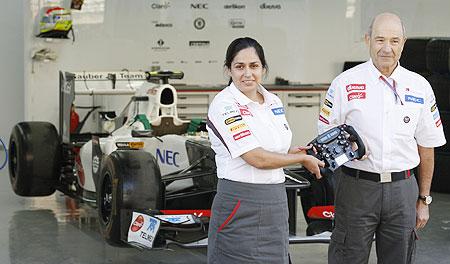
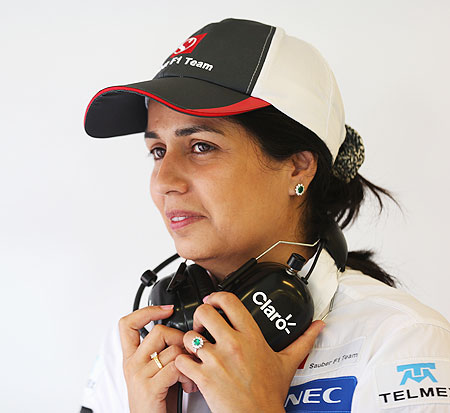
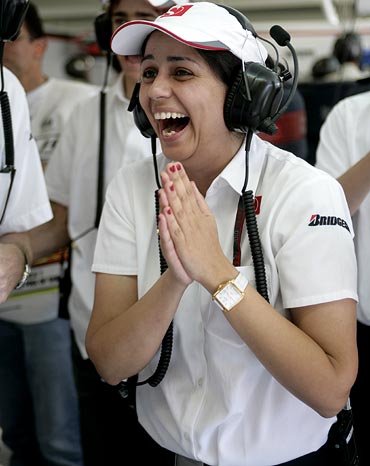
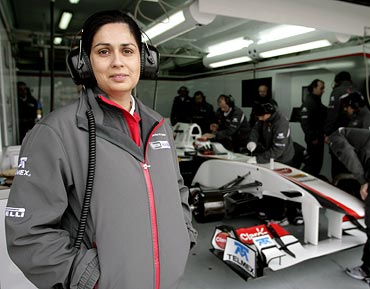
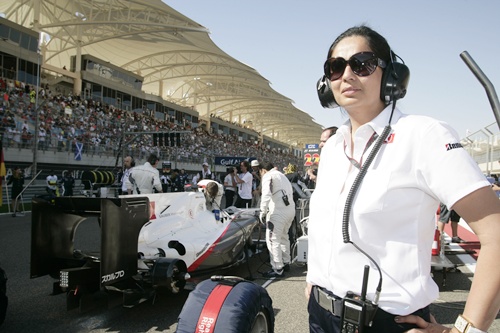
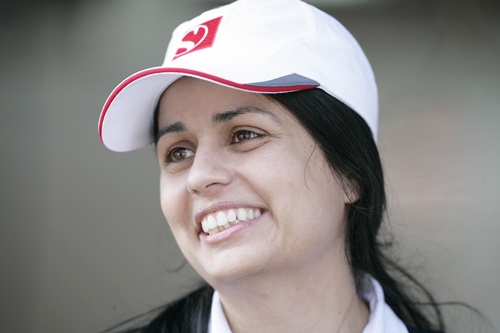

Comment
article